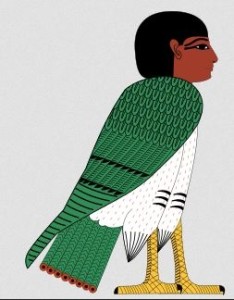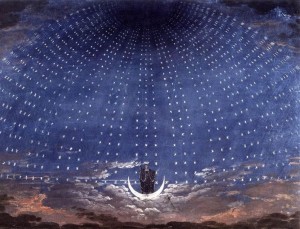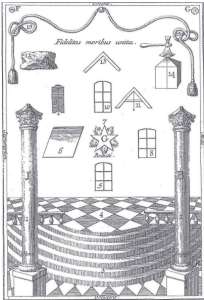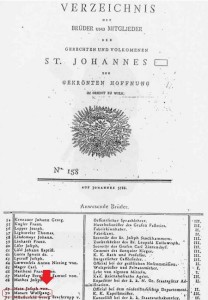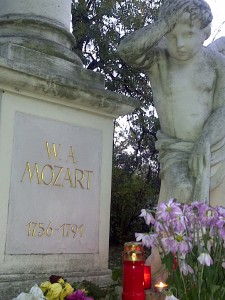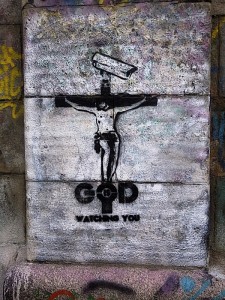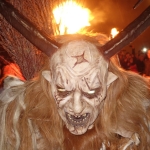MOZART, THE FREE MASONS AND THE MAGIC FLUTE (PART II)
Music is the most potent instrument in education because rhythm and harmony find their way into the inward places of the soul. – Plato
 On September 30, 1791, two years after the French Revolution, The Magic Flute premiered in Vienna. To work on what would be his last and one of his most celebrated pieces, Mozart temporarily moved in with Emanuel Schikaneder, the man who penned the libretto of The Magic Flute and also happened to be a fellow member of “Zur Wohltätigkeit,” Mozart’s masonic lodge. The opera opened to much acclaim but less than a month and a half after its debut, Mozart suffered a painful and mysterious death, and confided in his loved ones his conviction that he had been poisoned (see last week’s post: Mozart, the Free Masons and A Mysterious Death).
On September 30, 1791, two years after the French Revolution, The Magic Flute premiered in Vienna. To work on what would be his last and one of his most celebrated pieces, Mozart temporarily moved in with Emanuel Schikaneder, the man who penned the libretto of The Magic Flute and also happened to be a fellow member of “Zur Wohltätigkeit,” Mozart’s masonic lodge. The opera opened to much acclaim but less than a month and a half after its debut, Mozart suffered a painful and mysterious death, and confided in his loved ones his conviction that he had been poisoned (see last week’s post: Mozart, the Free Masons and A Mysterious Death).
Theories of Mozart’s death are as numerous and varied as the Gulasch in Vienna’s Gulaschmuseum. One proposes that the timing of Mozart’s death (so soon after the premiere of The Magic Flute) was no coincidence.
Indeed, since its origin, The Magic Flute, like episodes of South Park, has led a double life. For the unordained, the opera relates the age-old tale of the hero’s journey: a hero reluctantly answers the call to adventure and leaves the world he knows to undergo trials and overcome challenges to earn his reward and return home a new (and better) person. For those in-the-know The Magic Flute amounts to a 1791 shout-out to the composer and writer’s masonic brethren.
Below are just a couple characteristics of the opera that have provided fuel to the fire of speculation.
The goal of the free masons and Tamino in the opera is to overcome that which ruins the spirit of man (perverted thought, uncurbed emotions and destructive actions) in order to ascend the stairs of the one Lodge – the Universe – to attain universal oneness.
Unification of opposing forces of the universe to achieve oneness: On the one side you have the dark evil Queen of the Night who also represents in addition darkness/Isis/Booz/feminine/moon/fire/evil/chaos and on the other you have Sarastro who represents light/Osiris/Jakin/masculine/sun/water/good/order. You can go deep into philosophy, psychology and spirituality here and simply say it’s like Yin and Yang, good cannot exist without evil, there can be no Sonnie without Cher — you get the picture.
The steps of a Freemason: Entered Apprentice (youth), Fellow Craft (manhood), Master Builder (old age) – we see similar representations of Tamino as he undergoes his journey in the opera.
The Masonic Triangle (you know the one – look at the back of your 1 dollar bill) reflected in the many groupings of three in the opera:
Three boys: In the Magic Three, three young boys offer Papageno and Tamino guidance on their journey. They demand of Tamino three traits: steadfastness, patience and secrecy – three golden rules of the free masons. They are thought to symbolize the two deacons and the master of ceremonies of a lodge who likewise accompany new masonic apprentices on their symbolic journey during which they must face the trials of two of the four basic elements: fire and water. Symbolically they may also represent a person’s inner voice of reason.
Three temples appear on stage in the Magic Flute: The “Temple of Wisdom”, the “Temple of Reason” and the “Temple of Nature” similar to three of the pillars of belief of the free masons – the other two: strength and beauty. The Temple of Wisdom (Solomon’s Temple) should symbolize the temple of humanity, in which all people are “brothers” who should unite in a higher spirituality. (Beethoven was a mason too which — if you read the lyrics of Ode to Joy explains the brotherhood concept pretty well).
The three chords in E-flat major in the overture and grand final: Mozart had written quite a few numbers for the masonic lodges and liked to use E-flat, which has three flats arranged in triangular form (the “Masonic Trinity” sheet music style). Since then, the E-flat has often been referred to as the Masonic key.
Three musical knocks throughout the opera represented by wind instruments (beginning of second part of overture).
Characters in the Opera
Tamino: The initiate who is willing to undergo the trials set forth in order to achieve a higher state of being is thought to symbolize a masonic initiate.
Sarastro: (the Italian name for Zarathustra) The spiritual leader who resides in the seven circles of the sun -perhaps symbolic of the lodge Grand Master. Or perhaps Osiris (believed to be the personification of Truth) and the powers of the sun. In freemasonry seven represents the seven liberal arts and sciences (grammar, rhetoric, logic, geometry, arithmetic, music and astronomy) but also the seven planets (belief at the time).
Papageno: the character of Papageno is a bird catcher and someone satisfied by life’s simple pleasures. Rather than striving to reach a higher state of existence/awareness, Papageno would prefer to forgo hardship in order to indulge in earthly delights (women and wine). Nowadays, Homer Simpson would be the embodiment of Papageno. Many purport that masonic beliefs also based on principles and values from ancient Egypt. Indeed, the first set designers of the opera referred to drawings of Egyptian monuments. Interesting is therefore the similarity between Papageno, a creature with a man’s head, and a bird’s body, and the ancient Egyptian creature of Ba. Ba has been described as the spiritual part of human beings that survives death – that part that makes you who you are and unique from everyone else and the Egyptians believed rises from the corpse to embark on the journey into the afterlife. An explanation of how both theories would coincide is that perhaps only that part of a soul able to overcome secular desires for the sake of spirituality will exist beyond the earthly world.
Symbolic rituals/tasks
Rites of purification before entering the temple: thought to be symbolic of lodge rituals.
The journey of the initiate from the veil of the night (the Queen of the Night – Isis and the powers of the moon – represented in the number 5 and the star (five points)), into the Sun Temple of Sarastro (represented by the number 3 and the triangle or pyramid) The ascension of an initiate from apprentice to fellow craft to master builder.
Environment/ Objects
The forest: perhaps a symbol of the unconscious and all its wilderness
Nature: animals tamed by the magic flute – harmony with nature – order from chaos
Magic flute: an instrument crafted from wood that turns into gold by the end of the opera (ancient Egyptians were thought to be master alchemists who held the secret for producing precious medals). Music holds the power to instill harmony and raise “man” to otherworldly states. The flute enchants nature and brings it under control.
White robe: At the end of the journey the initiate is given a white robe representing purity.
Historically the masons have upheld a strict code of confidentiality, in part, to survive. They didn’t want to suffer the bloody end of the Knights of Templar who got on the wrong side of the king. Many of the ideas promoted by the free masons (education over birth – meaning a commoner could be equal to a nobleman) were threatening to the established systems (like the nobility and the Roman Catholic Church). Even more so at the time of The Magic Flute since its debut immediately followed the French Revolution. In addition, the masons probably recognized early on that a secret handshake here and a discreet compass there had a cool factor that drew members. Every child with a clubhouse, gang with a pair of shoes, and military unit with a clandestine mission knows that the secret knock, shoestring color, or patch makes you “in” and when you are “in” you are not “out” and can be readily identified by fellow brothers as one of the gang and not a woeful wannabe.
Was Mozart’s work on The Magic Flute somehow connected to his death? The free masons are infamously strict about their code of secrecy and said to have graphic symbolic gestures which signify the painful death he who breaks the code of silence will suffer.
Did the interweaving of masonic symbols into The Magic Flute amount to a severe and fatal breach of confidentiality? Since Mozart’s body was buried in a mass grave in St. Marx Cemetery in Vienna, the world will probably never know for sure. What would seem to exonerate Mozart’s brothers from accusations of foul play is the fact that Mozart’s fellow collaborator in The Magic Flute, Emanuel Schikaneder, continued to live and perform another two decades before losing his marbles and dying impoverished in Vienna at the age of 61.

The Magic Flute by W.A.Mozart. BBC/animation/ part1
The Magic Flute by W.A. Mozart BBC / animation / part 2 Check out the dancing rhino – who can resist a dancing rhino? Gotta get me a magic flute to calm down spectators at heated soccer matches!
The Magic Flute by W.A. Mozart BBC / animation / part 3

